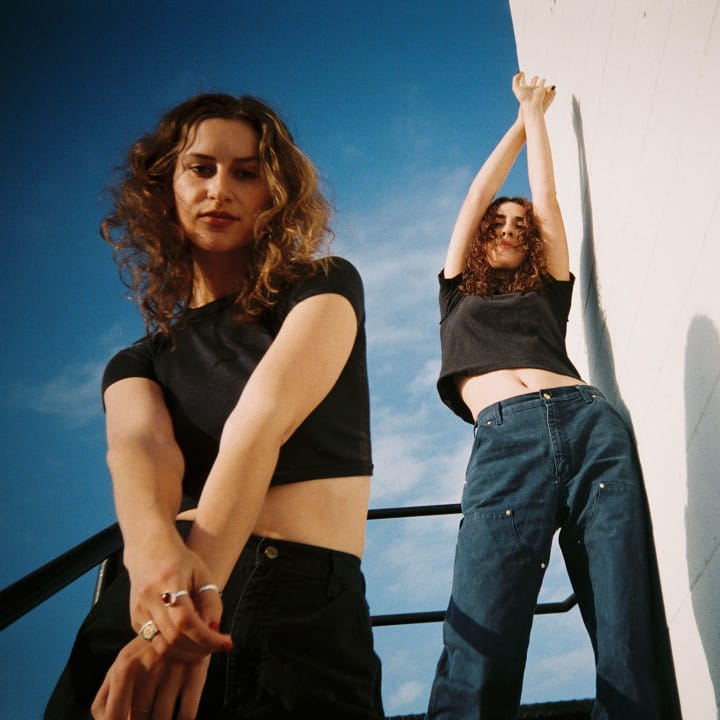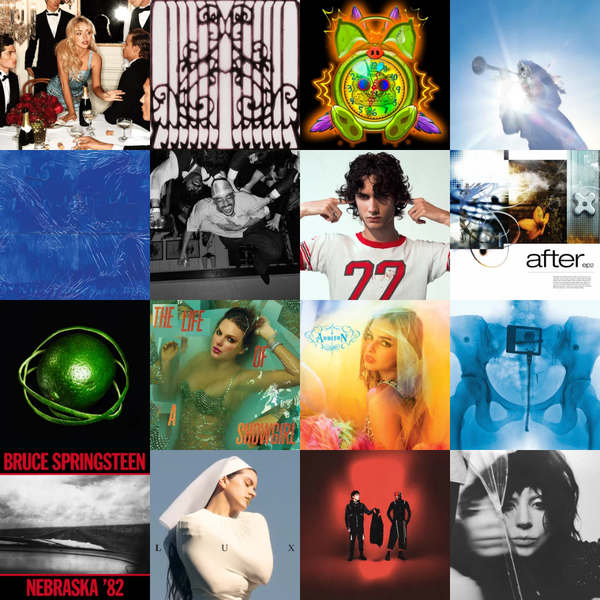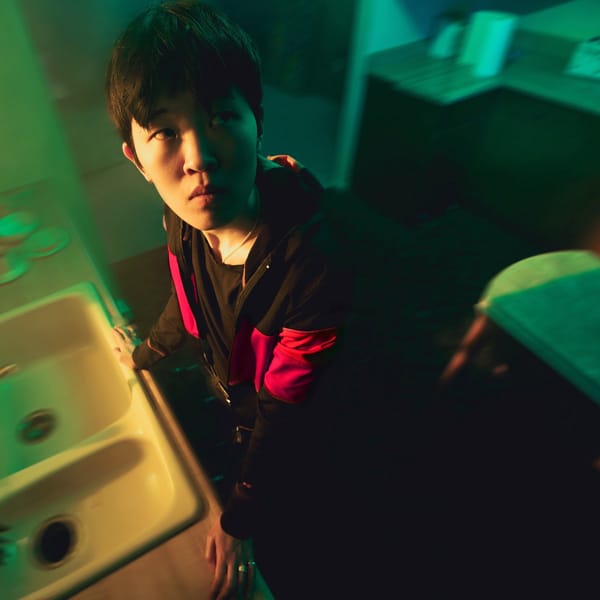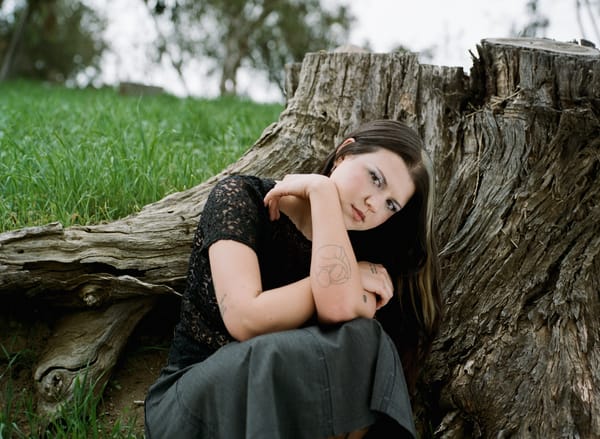Nothing Deep To Say #2: Tommy LeFroy on their Patchwork Single "Worst Case Kid"

In the automatic transcription app I use, Tessa Mouzourakis and Wynter Bethel blend together - a sentence will often start as Tessa and then switch to Wynter. (It also switches to me; it’s not very good at identifying voices, but stay with me here.) On their studio recordings the pair often chant in unison, lending brute force to their vulnerable lyrics about young adulthood. But they are, in fact, two people, in two different DAWs, from two different places – Wynter from America, Tessa from Canada. Two fledgling industry songwriters obsessed with Boygenius, they started a project together over lockdown and promptly blew up over TikTok.
“Worst Case Kid” is about many things at once — queerness, PMDD, familial expectations — and the song’s maximalism (especially from a band best known for the one-minute song "Flight Risk") reflects that: big drums, soaring harmonies, and lots of massive fuzz. It's different than anything the band's ever made before, but also feels something like a creative breakthrough for a duo that's already broken through. “Kid” was produced by the duo with Jonah Summerfield, who’s also worked with thoughtful synth-rocker Dylan Fraser and main-pop-girl-in-waiting Holly Humberstone. They've opened for Samia (who guests on Rivals EP track "The Mess") and former One Direction member Niall Horan, then gone on their own headlining tour supported by Nothing Deep To Say guest Pictoria Vark - they hold their own with any of their peers, and they're talented vocal producers to boot.
How did you get into production and mixing?
Wynter: I grew up playing in bands with boys and a lot of them were audio nerds. so it was always watching from the sidelines a little bit. It wasn’t until I I went to Belmont University and I studied music business, but my emphasis was in audio production. And so that's when I first formally studied recording. When I was young, I always wanted a laptop, but we couldn't afford it. So I got like a four track tape recorder, and that was how I first actually started like recording things and layering harmonies and things like that.
And so I think even that just feels like the beginning of our approach to layers, especially vocal layers. We're primarily vocalists, so it's just something we've always done. I studied audio production at Belmont University in Nashville, Tennessee, and it was very much Pro Tools centric. In Nashville, I was very much taught that it was the industry standard and I'm grateful for it because when we're in bigger studios now, a lot of them do have Pro Tools. So I'm a Pro Tools loyalist. At this point though, we're starting to use Ableton.
Tessa: Since I was a kid, I've always been really obsessed with being creative using computer software. I used to make music videos with my friends and by myself on Windows Movie Maker and I'd make songs on GarageBand, like I just loved computer software and teaching myself how to use those kinds of programs. Logic felt like a natural progression for me because I had learned something from GarageBand. I’m completely self-taught, I've never learned aside from learning from my friends. I have never learned in a professional capacity. And so it was very much just like a lot of trial and error, a lot of watching YouTube videos and a lot of literally asking our friends who are producers, what they do, what plugins they like to use, how they EQ this guitar… And I'm really lucky that everyone has been so patient and excited and willing to help me learn. But the most learning I did was obviously over lockdown when we first decided to start this project and produce it ourselves. And at the time too, one of my roommates was a producer who also worked in Logic, so that was helpful because anytime I'm stuck, I could ask him to help me with it.
Wynter: I feel like it's also worth noting that we both worked as songwriters for years, and I learned a lot from watching session producers work, like when we were working on songwriters, we were primarily top liners. So just coming in and focusing on words and melody, helping the artists tell the story. But every day you watched a different person, a lot of times with different DAWs, working and just seeing everyone's approach was super helpful. I feel like not enough producers get that opportunity to be collaborative and talk to each other.
Talk about writing Worst Case Kid.
Wynter: "Worst Case Kid" was actually the only song on any of the EPs that we fully started in someone else's studio [Jonah Summerfield]. Which was largely in part because since we've been in the UK, we just don't have access to all of our gear and things. He actually started writing the song in his studio, and a lot of times we bring finished songs if we're co producing with someone else. But that was a unique instance in which we came in that day and just started the idea from scratch.
Tessa: So pretty much all of it, except for. Like a few little noodly guitars that I recorded in my room, but most of it, we all did together in Jonah’s studio.
Do you feel like you have different styles of songwriting and producing?
Tessa: We definitely do have differences, we are individuals and we have different instincts. But we definitely have tendencies or similarities that complement each other with layering and we definitely are both very keen to fuck around and find out in that sense. We love using a lot of found sounds, or borrowing from samples from the real world, we're always taking voice memos, and things, when, if we're out, and there's church bells, or people, a crowd of people, we have tons of that, and it's something we incorporate into the music a lot.
Wynter:. We definitely have different styles: songwriting-wise, I’m always looking for an anthemic chorus. Tessa really loves to reference literature and things, which I think is so much of the Tommy Lefroy sound. And it's been so fun when we are writing, we're always thinking about things like painting, art, literature, history, things that we can reference in the writing. And it's very much become like part of the Tommy world. And production wise, like I love layers and polyrhythmic elements and syncopation, I think it’s part of having ADHD. I just need a lot of stimulation listening to the music and my favorite music is really complex, but it also is like loving sort of cinematic music and music that just really lifts you and takes you somewhere else.
Tessa is so good at finding just cool sounds and weird tones and things where it's just like, how did you get that to sound like that? Cause I've never heard anything like that. And I think we're both really drawn to the combination of those.
How does your dynamic change in the studio versus working on your laptops?
Wynter: It definitely varies, song to song. I know it's a non-answer, but it's true.
Tessa: It's definitely interesting when we're working with another producer because sometimes It tends to like, end in their DAW, which takes a lot of trust, because we're very used to fine tuning and hyperfixating on every last detail until the very final minute so that's certainly a different experience. I think when we started working in the same room, certainly there were aspects of it that felt faster or we could make creative decisions a lot quicker because we were doing it in real time.
Before, we also had an 8 hour time zone to compete with. So if we wanted to make a couple changes on one track, or we were asking for the other person's opinion on something. We'd have to wait until they woke up before we could really assess what was going on. So certainly there are days where it feels a lot, just like quicker, like we work faster.
It's really nice for us to be able to have that focused time apart where we can just fuck around and not feel self-conscious or just play with different ideas. And I think because we're both so used to working at the computer, it's hard sometimes when one person is working at the desk and the other is not. We're also pretty good at having a lot of different songs in different people's DAWs at different stages. It is a hodgepodge process, but it mostly works for us.
Wynter: One of us has to drive the boat, so we still end up doing more things apart or spending some time apart - a song will start in one of our DAWs, and we'll go in on it individually and then bring it together. But I think writing has been so much easier together because making those choices in real time, melody, harmony, what you sing, what I sing, obviously so much easier when we're in the same place.
But for production, I think, We tend to perseverate over choices when we're working together and sometimes we start apart and then show each other things, and it's nice because it allows you to listen from a different perspective. Working together has made it more efficient, but it's also brought new challenges that we've had to adapt to.
On Writing Worst Case Kid
Wynter: We wrote it last summer and we are both in London and far from home and having a bit of a dysphoric summer. We were really struggling with a few things and also needing an anthemic song. We needed a Springsteen esque song, like we just wanted something that felt big. We met at the studio and it was like, okay, we want drums right away. We want a soaring melody, it's a harmony split right away so many of our earlier songs are in unison - so it really was like a departure in a lot of ways.
In the press statement, you mentioned PMDD and mental health, but a friend said you mentioned it was about a queer relationship.
Wynter: Oh, it's about so many things, I think! The first verse was from some poems I had in my notes, and the second verse was from some poems in Tessa’s notes.
Tessa: It's hard to come up with a concise press statement because there's two of us and the lyrics even mean different things to us and - “I always feel like a tourist want to know what it's like” is both about being North Americans in London and the experience of queerness and or like early experiences of it. wondering what it's like.
If you had to sum up what was going on, PMDD also had a lot to do with that, but each individual line comes from a different place.
There's also “I could have been a lawyer”, which calls back to some of the other lyrics on the EP.
Tessa: The could have been a lawyer line was definitely one from me, That one and “staring down the barrel of another life.” I think there's definitely, I've certainly felt a lot of familial pressures. My father came from a long an immigrant family, and so there was certainly a lot of pressure on following a more traditional role.
I think sometimes you just feel a moment of despair and you feel like, where, at what point did I make the wrong choice? I think it was more in reference to sometimes just feeling, somewhere, something went wrong in the puzzle and maybe you went the wrong way.
Can you talk about writing this song without a chorus?
Wynter: I think it comes from spending years as songwriters where you were catering to someone else's notion of what the structure should be. And so many people had a very fixed idea of like conventional song structure. One of my favorite things about this project has been being able to throw that out the window and do whatever you want.
And obviously we still have those sensibilities of yeah, verse-chorus, whatever, but being able to push the boundaries of what is a chorus? And thinking maybe this song doesn't need a chorus and people will still remember the words. I think that the craziest thing is being able to experiment and still have people remember the words, even if it's not like a super pop, simple thing, I think it's been so cool to be able to just be free with structure.
What are the ambient backing vocals in between verses?
Tessa: I think a lot of those are me.
Wynter: Yeah, it was just an ad lib. It might have even been in the initial like scratch vocal takes where we're just trying to get the melodic ideas down. A lot of the vocals like most of my lead and definitely those vocals were from the very first pass through of just like getting it down and then there was just a quality to it that it was like, oh that should just be in the song.
Tessa: Yeah, those were just me like messing around a little bit for sure, I thought they were fun. They had a funny quality to them. We generally love to go a little bit ham with vocals, obviously, and we love to have fun with it, and this one in particular, like I'm sure you saw in the videos, but we did whisper takes, we did scream takes, we did scary takes, we got Jonah to sing on it, and then we like distorted his vocals, so you can hear him especially in the second verse, I think.
Wynter: It was so cute because Jonah is British and the line, yeah, I always feel like a tourist. He kept saying tourists. And we were like, no, you have to match our vowels.
Tessa: You have to match our stupid American vowels.
I want to ask what the tape effects are from. Is that real running through a tape? Is that a SketchCassette plugin?
Tessa: That's real. Jonah had an old tape machine and we ran the drums, a lot of the vocals. We did a lot of things like doubles and harms through the tape machine. I think we may have run some of the guitars through the tape machine as well, honestly.
You've talked about your favorite plugins before - do you still rely on plugins or do you use more analog gear now?
WYNTER: We still have go-tos for sure.
TESSA: I think we produce on the move a lot. So it's not like we always have access to those things. But we have our go tos - we used a lot of Decapitator, we're big fans of Soundtoys. I also have a fuzz mic - we've used it more in the live show but it's this like boutique french mic it's called a Fuzzy Phone and we did use it on Dog Eat Dog. Most of the tracks on "Worst Case Kid" were processed with Decapitator, but I also love Manny Marroquin's Distortion plug-in.
Are you always recording when you're in the studio?
Wynter: Yeah, when we're writing, I definitely find it helpful to just have a voice memo going because so often you'll do, one of us will do something and it's oh, that's it. and then it's what did I just do? You like black out. So I think, I definitely think when we're writing, it's super valuable. I think in the studio, I will generally do a ton of takes of something and then I'll go through and comp or find the parts, but I love to be intuitive.
Something Deep To Say #2 coming soon for paid subscribers!


